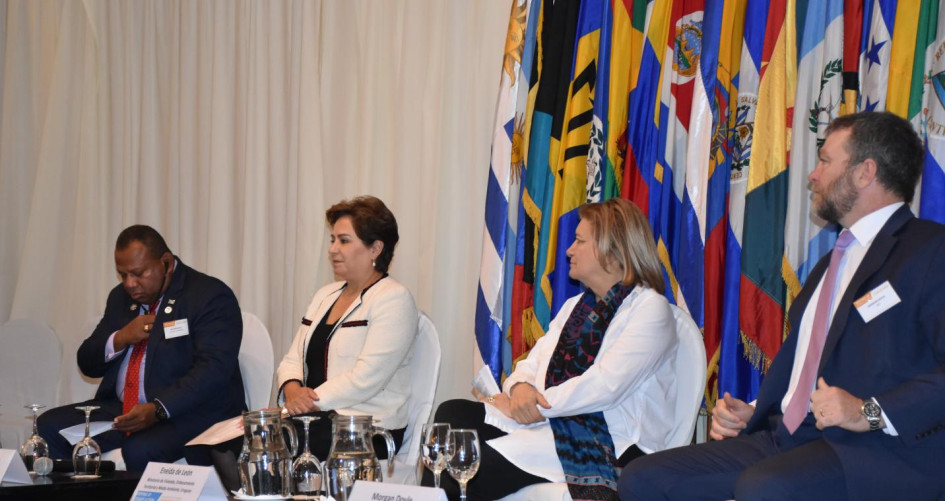Uruguay, 23 August 2018 – Today marks the close of the Latin American & Caribbean Climate Week, which has been showcasing groundbreaking action underway in the region to dramatically reduce greenhouse gas emissions and build resilience to the unavoidable impacts of climate change.
The event reached its apex with the high-level segment on Wednesday, which was opened by UN Climate Change Executive Secretary, Patricia Espinosa; Brazil’s Minister of Environment, Edson Duarte; and the country’s host, Uruguay’s Minister of Housing, Territorial Planning and Environment, Eneida de León.
Delegates attending the Climate Week in the old town of Montevideo, raised concerns that the funding levels announced in 2015 are not being achieved in line with the successful implementation of the Paris Climate Change Agreement.
The effects of this funding gap will be felt acutely in a region that has so much to lose from the impacts of climate change. Brazil alone holds 20% of the known biodiversity species on the planet and has more than 50% of its area covered with native forests.
Uruguay’s Minister of Housing, Territorial Planning and Environment, Eneida de León used her keynote speech to underline this point further: “Our region is particularly vulnerable to the adverse effects of climate change, where the vast majority of loss and damage that we suffer is directly related to extreme weather events. Future projections are not encouraging. Paradoxically, developing countries are the ones that contribute least to climate change, and yet we suffer the greatest impacts.”
Yet despite this sobering reality check, there was still cause for optimism at the Climate Week. Brazil’s Minister of Environment, Edson Duarte reported that his country has already achieved substantial reductions in greenhouse gas emissions. Specifically – statistics obtained by REDD+ – demonstrate that actions in the Brazilian Amazon now surpass 6 billion tons of CO2, equivalent to the emissions of a year and a half of the entire European Union.
Afterwards, Minister Duarte hailed this year’s Talanoa Dialogue as the world’s main chance to generate the ambition necessary to secure a low-carbon future, saying, “The Brazilian government has initiated the Talanoa Brazil Dialogue, which, by strengthening trust among national actors and identifying where we are and where we want to go, aims to organize the country's messages for the Talanoa Global Dialogue, which will take place at the Climate Conference in Poland later this year. We urge our brothers from Latin America and the Caribbean to make the same move, so that we can arrive in Poland with clear objectives.”
Effectively serving as a bold call to action ahead of the Ministerial Talanoa taking place at COP24 this December, such remarks show how the regional Climate Weeks have a vital role to play in bringing local actors together to shore-up climate action. As such, the Climate Weeks must become a mainstay of the climate action calendar – a point which was not lost on UN Climate Change Executive Secretary, Patricia Espinosa: “By tackling climate change we can tackle more than just the weather. We can address more than just numbers and statistics. We can create a better world. That’s why this Climate Week is so important. It’s a chance for us to hear about the challenges actors face and the specific work being done here to address them; solutions that might be applicable elsewhere.”
The Climate Week culminated in a regional edition of the Talanoa Dialogue, which was led by the Government of Uruguay and featured high-level Climate Champion, Inia Seruiratu, Fiji's Minister for Agriculture, Rural & Maritime Development.
The event was orchestrated by the members of the Nairobi Framework Partnership: UN Climate Change, United Nations Development Programme, World Bank, United Nations Environment, UNEP DTU Partnership, International Emissions Trading Association (IETA), the Inter-American Development Bank IDB, the Latin American Energy Organization OLADE, Low Emissions Resilient Development Strategies LEDS LAC Platform and the Latin American Development Bank (CAF).
For media enquiries relating to the regional Climate Weeks, please contact:
Matthew Phillips: mphillips(at)unfccc.int
About the UNFCCC
With 197 Parties, the United Nations Framework Convention on Climate Change (UNFCCC) has near universal membership and is the parent treaty of the 2015 Paris Climate Change Agreement. The main aim of the Paris Agreement is to keep a global average temperature rise this century well below 2 degrees Celsius and to drive efforts to limit the temperature increase even further to 1.5 degrees Celsius above pre-industrial levels. The UNFCCC is also the parent treaty of the 1997 Kyoto Protocol. The ultimate objective of all agreements under the UNFCCC is to stabilize greenhouse gas concentrations in the atmosphere at a level that will prevent dangerous human interference with the climate system, in a time frame which allows ecosystems to adapt naturally and enables sustainable development.
See also: http://unfccc.int
Follow UNFCCC on Twitter: @UNFCCC| español: @CMNUCC
UNFCCC Executive Secretary Patricia Espinosa on Twitter: @PEspinosaC
UNFCCC on Facebook: facebook.com/UNclimatechange
UNFCCC on LinkedIn: UNFCCC
UNFCCC on Instagram: @UNFCCC
